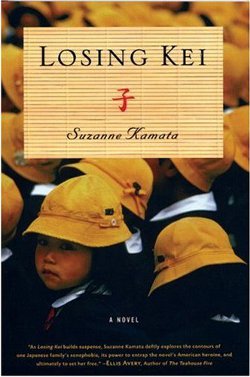 |
Losing Kei
by Suzanne Kamata
Avaliable in paperback from Amazon.
For
all its beauty, safety, and oddly feminine charm, Japan is and always
has been a man’s world. This is especially true of expatriate
writing about Japan where the vast majority of books are written by men.
Also, most writing about Japan tends to be non-fiction travelogues
and/or self-discovery memoirs that tend to suffer from the same tone:
it’s really different over here; I have so much to learn;
rice with rotting beans makes for a really lousy breakfast
Susanne
Kamata’s novel Losing Kei (Leapfrog
Press, 2007) is a unique
and entertaining break from all that.
|
When we first meet
Jill Parker she is stalking a young boy and hoping to catch a glimpse
of his face. Just as she does, a woman she knows as his grandmother
rushes out and pulls him away, pressing his head “firmly
against her side.” Jill then admits that the boy is her son,
Kei, and that she has lost him again.
This short scene
introduces us not only to the key players in the book, but also the
conflict that drives it. Soon, as the book jumps around in time, we
meet Jill as a young painter who, almost on a whim and as part of an
emotional rebound, departs for Japan. Once in Japan she opts for
isolation and chooses a small city in Shikoku because she’s
heard it’s almost foreigner free. There she becomes a hostess
at a bar, does a little painting and falls for Yusuke, an art gallery
owner who treats her differently than other Japanese men, and even her
own family, by telling her she has talent and encouraging her to keep
painting.
Eventually, Yusuke
and Jill marry and have a child. At this point, Jill’s desire
to be more Japanese clashes with her western instincts when she
discovers, and learns to resist, the role of wife-as-servant in her
husband’s house. This leads to battles with Okasan,
Yusuke’s mother—and the grandmother from the
opening—who demands the untraditional wife fulfill
traditional Japanese duties.
For this and other
reasons, the couple divorce and Jill learns she has no rights to her
own child. This leads to a pursuit that slowly and steadily grows in
intensity and, your humble editor would argue, culminates in a
simultaneously beautiful and preposterous scene that nonetheless
somehow works. The novel’s ending, which will seem
deus-ex-machina to some readers, is culturally perfect and a suitable
end to the long struggle over Kei.
Despite his enjoyment
of the book, your humble editor did have a few issues with it: first,
in his copy, pages 97-128 were repeated twice and, therefore, pages
65-96 were missing. If possible, readers should carefully check their
editions before purchase. That said, the missing pages didn’t
hurt his overall enjoyment of the book, but it did cut out at least
three
key plot points. Your humble editor also didn’t fully
understand the nature of the fellowship that brought Jill to Japan and
was surprised she could suddenly opt to change cities and do no
fellowship-related work.
Also, although the
book portrays the cultural dilemma and the characters well, it seems to
take place on a blank background. Except for a description of surfing
and a terrific image of the detritus left on the beach after a typhoon,
the author spends almost no time with description and setting.
Tokushima could be any city anywhere. This is a surprise given that the
narrator is a painter. That said, Losing Kei is
driven by plot
and by character. What Jill does is, in the end, more important than
where she does it.
Jill
Parker’s goal was to go where no one spoke English, to
immerse herself and hide in the culture. Ironically, she clashes with
the culture and it causes her immeasurable pain. Kamata manages to
portray all this without being blatantly critical. The culture just is
and, ultimately, there is no moral to the story other than
perseverance. Why Jill does what she does is never always stated openly
but, in a quiet, very Japanese way, it is all consistent and all makes
sense.
For a Westerner,
Suzanne Kamata has produced a surprisingly Japanese
novel. Your humble editor recommends it for all expatriates coming to
Japan. For those considering marrying into a Japanese family, it should
be considered required reading.
NB: Your humble
editor also recommends that long term sufferers check out Playing for Papa by Kamata and
Yuka Hamano. Although written in English and Spanish, it's a nice
children's book about an atypical family in Japan.
 
|